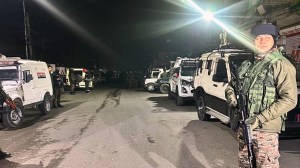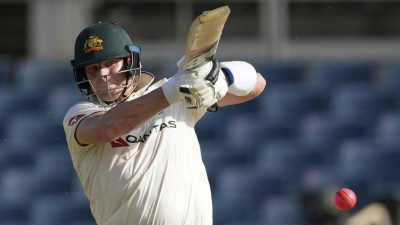The bodies of the three labourers from Rajouri, who were killed in an alleged encounter by the Army in South Kashmir’s Shopian in July this year, were exhumed in Baramulla in the early hours of Saturday and handed over to their families, Inspector General of Police (IGP), Kashmir, Vijay Kumar on Saturday confirmed that the bodies were exhumed.
Mohammad Yousuf, father of Abrar Ahmad, one of the victims, told The Sunday Express: “Now they have given us the bodies, we demand the death penalty for those who killed them. It is my right. Let their families also feel what it means”.

Guftar Ahmad Choudhary, a social activist from Rajouri who accompanied the families of the slain trio to Baramulla for the exhumation told The Sunday Express, “Right now, we are on way back to Rajouri.”
Story continues below this ad
The development came hours after Jammu and Kashmir Director General of Police Dilbagh Singh on Friday said that the legal process for the exhumation would be “completed soon”.
“The exhumation took place at around 5.30 am (Saturday),” Choudhary said. “The SSP (Senior Superintendent of Police, Baramulla), DSP and a magistrate were present during the exhumation.”
Fathers of the slain trio were present. The families left for Rajouri in an ambulance with the bodies immediately after the exhumation process.
Imtiyaz Ahmad (20) and Mohammad Ibrar (16), residents of Dharsakri village, and Abrar Ahmad (25) of Tarkasi village of Kotranka, Rajouri, were killed in an alleged encounter in Amshipora village of Shopian, in south Kashmir, on July 18.
Story continues below this ad
The Army and the police had dubbed the three as unidentified militants and buried them discreetly in a graveyard in Baramulla, north Kashmir.
Alleging an attempt at a cover-up, Yousuf said, “It has been a long struggle for us. Why and how did they (forces) dub them as Pakistanis when they were carrying Aadhaar cards? Had the photos not been leaked (on social media), they would have hushed it up.”
On August 10, pictures of the bodies of the trio had appeared on social media. The families had earlier filed a missing report with Rajouri police, stating that their sons, who had gone to Kashmir for work, were missing since the night of July 17, when they had last called home. As the images went viral on social media, the families identified them, leading to the Army ordering a probe into the killings.
On September 18, the Army’s Court of Inquiry confirmed that the three men killed in the Amshipora encounter were labourers from Rajouri. The identity was further confirmed by DNA test. The Army statement also said its probe had “prima facie” found that its troops exceeded powers under the Armed Forces Special Powers Act (AFSPA) and directed disciplinary proceedings against those “answerable”.
Their room on rent still as it was
Story continues below this ad
At Chowgam, Shopian, the room where the three men last stayed are still bare, barring two blankets that lie crumpled on the floor.
On the wall above, a shirt and a pair of pants hang from hooks. Two sets of slippers, a pair of socks lie strewn around the room.
Their last half-eaten meal lies covered in a layer of fungus in the copper pot in which it was cooked. The shelves still hold their sparse belongings—a set of plastic plates and a couple glasses, an empty water bottle.
The owner of the house, Fareeda Bano, says that the three had no bedding and she gave them one of the blankets to sleep on. “We shut the room and left it as it was,” Bano said. “Sometimes we get questioned by the Army, sometimes by the police, about the men who lived here. We thought it was best to just leave it as it was.”
Naveed Iqbal









